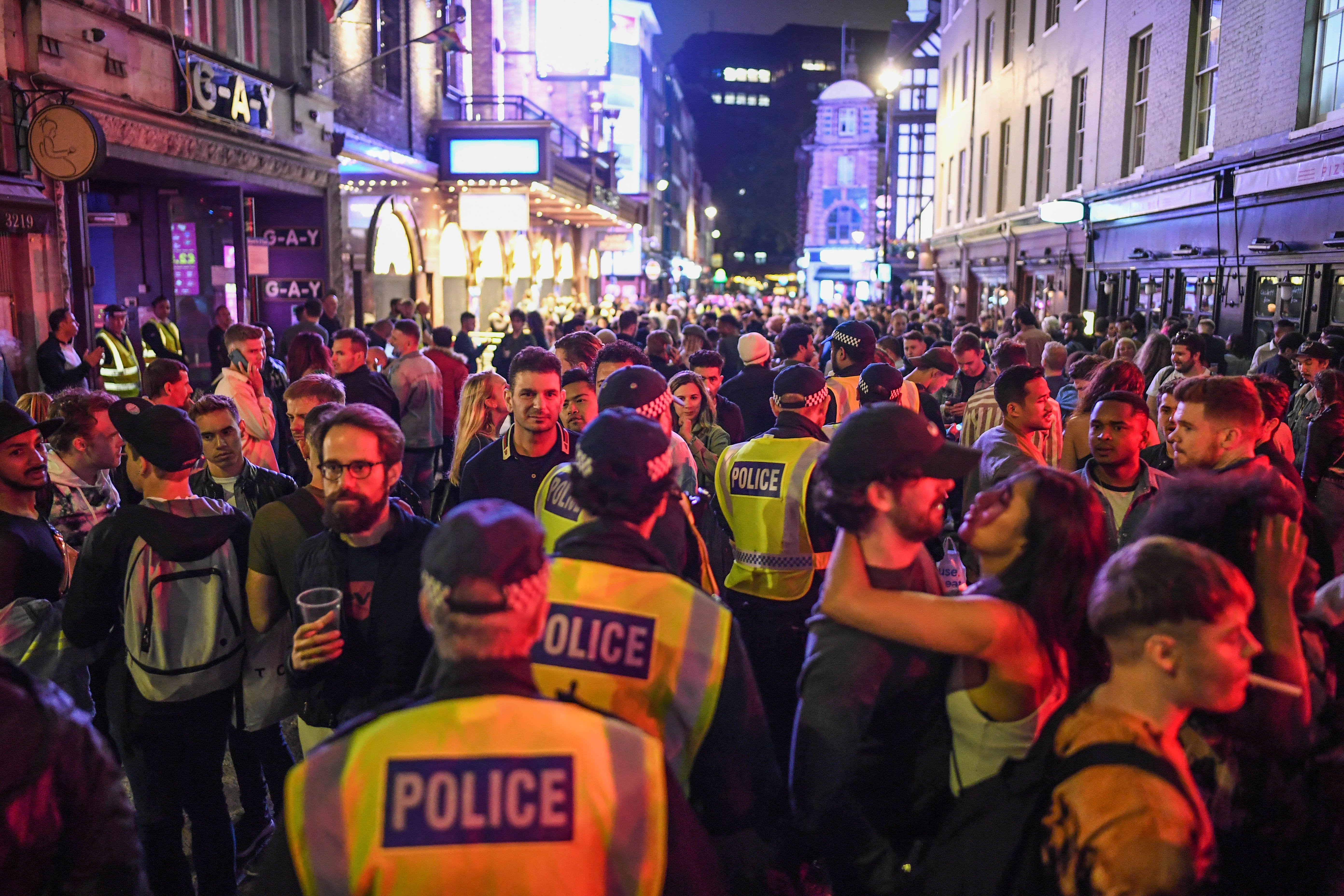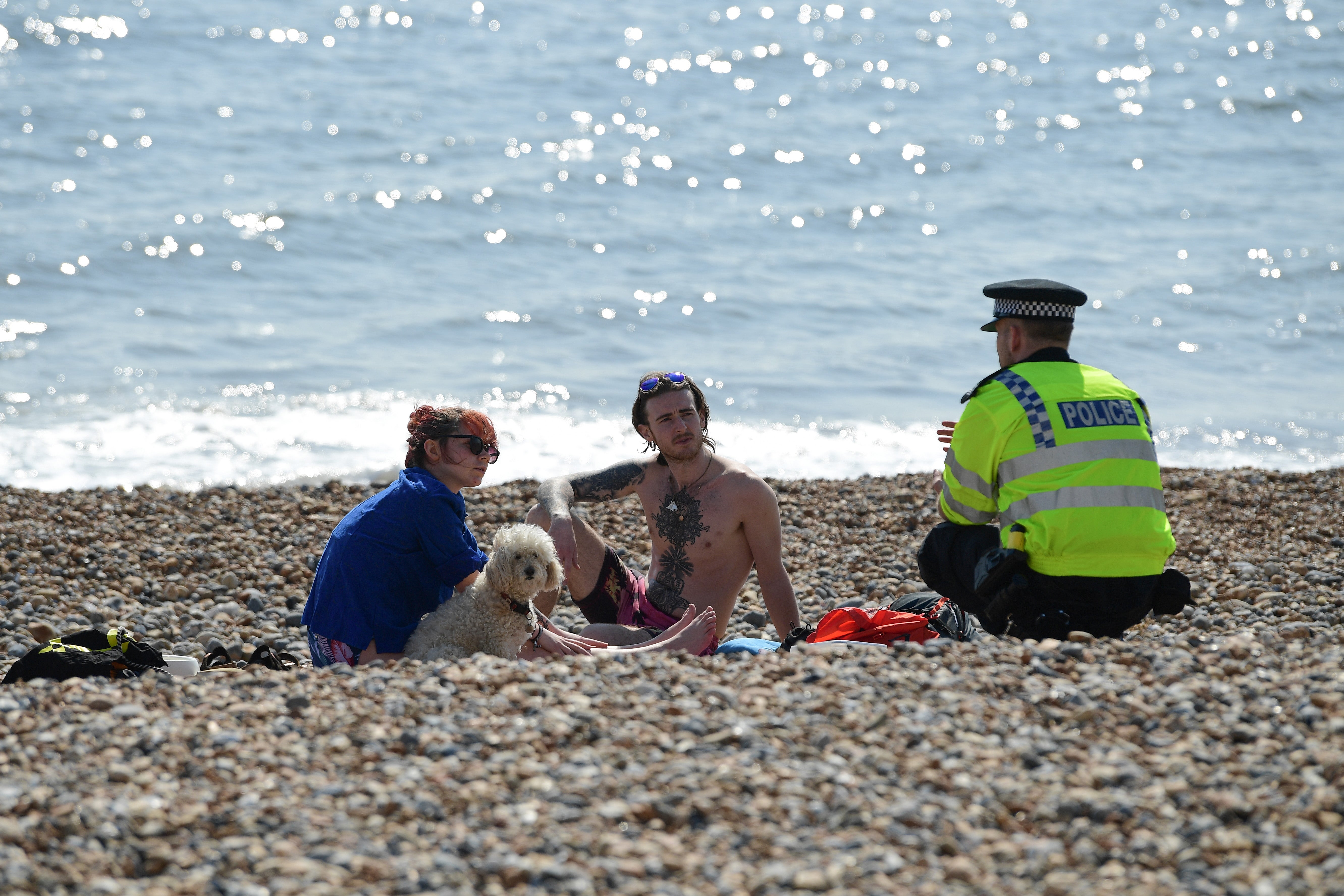Fears of police exodus after officers spend year ‘picking up pieces’ of rushed Covid laws
Exclusive: ‘A minister would say ‘the police will be enforcing that’ and we would be sitting here thinking, really? How are we going to do that then?’ one officer says

Police have been left to “pick up the pieces” of hastily written and badly communicated laws through a year of the coronavirus pandemic, officers have said amid warnings of a looming exodus when restrictions ease.
Senior figures said that serious concerns, including the potential for miscarriages of justice, were highlighted as far back as last April but were not properly addressed.
They accuse the government of failing to properly consult on changes to coronavirus laws, introducing them too quickly for police to immediately enforce, confusing the public with gaps between guidance and law and overexaggerating how strictly restrictions would be policed.
There are fears of an “exodus from policing” after the end of the pandemic, with many officers saying they are “sick and tired” of juggling the competing demands of coronavirus laws and normal crime.
Rank-and-file police officers were not told of the first national lockdown before it was announced by Boris Johnson on 23 March 2020.
Read more:
- Coronavirus: Police ‘in the dark’ about Boris Johnson’s lockdown announcement, senior officer says
- Almost a third of prosecutions under coronavirus laws dropped, review shows
- Coronavirus: Government confirms shops can sell whatever they have in stock, after police criticised for patrolling 'non-essential aisles' in supermarket
- Coronavirus: How woman ‘loitering’ at train station was wrongfully convicted in shambolic case
- Coronavirus: Police do not have capacity to launch ‘manhunts’ for people refusing to self-isolate, senior officer says
The prime minister told the public that if they did not follow unprecedented rules, “the police will have the powers to enforce them”, but laws underpinning restrictions did not come into force for another three days and have since changed more than 60 times in England alone.
A recent survey by the Police Federation, which represents more than 130,000 officers in England and Wales, found that only one in ten thought that Covid-19 laws were “clear”.
Paul Griffiths, president of the Police Superintendents’ Association, said the speed at which coronavirus laws have been drawn up was “shocking” compared to normal processes.
He said he heard of an imminent lockdown just an hour before the prime minister’s announcement on 23 March and that police had to “work through the night” to provide advice on how it could be enforced.
“We were very vocal early on, saying ‘be sure to be clear and consistent with your messaging both to the public and police’, and we have continued to say that,” he told The Independent.
“Early on the confusion was exacerbated because we had 43 forces applying it locally under slightly different interpretations, strategies and approaches.

“Never before have we had the public and police working through their understanding of new laws at the same time.”
He said the Police Superintendents’ Association was consulted about some changes to the Health Protection Regulations, such as switching from national restrictions to local lockdowns, but not others.
Brian Booth, chair of the Police Federation’s West Yorkshire branch, said the government had “set hares running” by floating planned restrictions or relaxations in the press, or announcing changes before laws were in place.
“It’s been very difficult managing this taking away of civil liberties, and it’s not been helped by wishy-washy releasing of laws,” he added.
“I think a lot of ministers didn’t understand the laws – they would go into a briefing and make a gaffe, and then officers on the front line would have to pick up the pieces.

“Officers have had enough, they’re sick and tired of this, and as soon as the job market reopens I think you’ll see quite an exodus from policing.”
Ken Marsh, chair of the Metropolitan Police Federation, said: “The laws have been changed 67 times in the last 12 months. At times we were given less than 24 hours to disseminate them, act on them and understand them.
“We were then vilified if we got it wrong, we were abused and harassed by the public, and then we got given another law.”
He said he felt there was “no way to police” some requirements, such as bans on gatherings in private homes and gardens, when coronavirus laws did not create a power of entry.
“They would do a briefing at Downing Street and a minister would say ‘the police will be enforcing that’ and we would be sitting here thinking, really? How are we going to do that then?” he added.
“It felt like the government were asking us to do more than we could, there was a lot of pressure.”
Neil Mennie, chair of the Kent Police Federation, said the “language and expectations of politicians of what police can do was disproportionate” as officers responded to routine crime, rising domestic violence and other demands.
Mr Marsh said police officers had found balancing the coronavirus pandemic with their normal duties “very challenging”.
“I think it’s been very unfair how the police have been treated throughout this by the government,” he told The Independent.
“Normal legislation goes through a whole ream of processes before it’s acted on, but we were acting on this after being given it at midnight the night before. That’s not acceptable and people are going to make mistakes, and we did.”
Analysis of figures released from a Crown Prosecution Service (CPS) review show almost a third of the 1,420 charges so far brought under coronavirus laws in England and Wales were wrong and had to be withdrawn or quashed.
Lawyers fear that a substantial proportion of the 70,000 or so fines issued in the same period were also unlawful, but that most people will have paid up rather than appear in court.
Harriet Harman, chair of the Joint Committee on Human Rights, warned on 10 April last year that “worryingly haphazard” messaging was creating the risk of miscarriages of justice, and seeing people punished without any legal basis.
But, almost a year later, she told The Independent that the committee was “not reassured that the picture of the state of the law for both the public and the police is any clearer”.
“The result has been that individuals have been prosecuted and fines have been issued for behaviour that was entirely lawful,” the Labour MP added.
“More needs to be done to protect innocent citizens from being criminalised and penalised.”
The National Police Chiefs’ Council (NPCC) said it had been in frequent contact with the government and all relevant partners to manage the implementation of regulations during the pandemic, “often in fast-changing and challenging circumstances”.
“We offer the views of chiefs and forces on the operational implications changes may have on policing,” a spokesperson added. “At all stages, together with the College of Policing, we have provided guidance to officers on use of the new regulations in place for everyone’s safety.”
The College of Policing said it had worked to “translate complex legislation into comprehensible and coherent briefings for officers” as quickly as possible.
A government spokesperson said: “The home secretary and policing minister have been in regular contact with policing leaders to discuss developments throughout the pandemic.
“The police have gone above and beyond to keep the public safe. We are extremely grateful for their hard work, flexibility and sacrifice.
“We have supported the police with almost £200m in additional funding since the pandemic began, and an extra 6,620 officers are on the streets as part of our campaign to recruit 20,000 additional police.”
Join our commenting forum
Join thought-provoking conversations, follow other Independent readers and see their replies
Comments
Bookmark popover
Removed from bookmarks